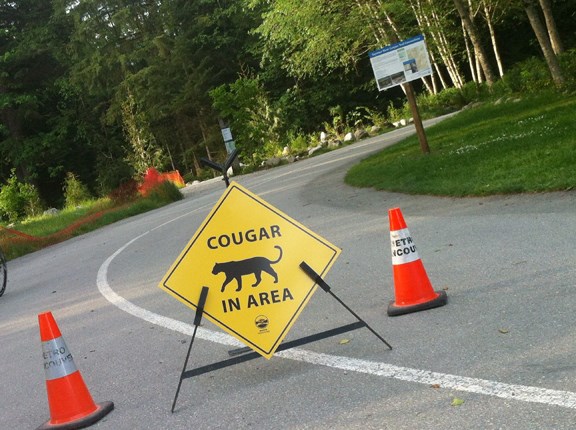Another cougar has been spotted on North Vancouver trails — this time in the area north of Capilano University.
The big cat was spotted by a woman at the nearby North Shore Equestrian Centre on Lillooet Road around 8:30 p.m. Tuesday. The woman was coming out of a barn with a horse, said conservation officer Robin Sano, when she rounded a corner and came face to face with a cougar coming out of some blackberry bushes at the back of stable property.
“She went back in the barn,” he said. “The cougar ran up the hill.”
Sano said he went to the property on Wednesday and found cougar tracks, confirming the sighting.
But he added the cougar appeared to have turned around when it saw the woman. “There was no predator behaviour, no stalking,” he said. “It’s completely normal for (a cougar) to be in that area.”
A patrol of nearby trails by RCMP officers Tuesday evening didn’t turn up any further signs of the cougar, although warning signs were posted at Capilano University as a precaution.
The cougar sighting this week is the latest in a rash of recent sightings of the normally elusive animals on the North Shore. In a couple of cases, people reported that cougars were approaching people and were not easily scared off.
More recently, conservations officers shot and killed a cougar that had been prowling a Lower Capilano neighbourhood near Park Royal in West Vancouver. In that case, officers deemed the big cat a potential danger after it was spotted on a number of balconies and patios in the middle of the day.
Sano said he’s not sure why cougar sightings are up this year. Good weather could mean more people have been out on the trails, where they’d be more likely to be spotted, he said.
Some of the unconfirmed sightings may not even be cougars, he added. “Some of it can be people being paranoid. If there’s a report on the news, then every orange cat you see or squirrel, it’s a cougar. We’ve had people call in and say it’s a cougar and it’s a raccoon or a Labrador dog.”
Hikers heading into cougar territory should travel in groups, carry a walking stick and make enough noise to ensure they don’t surprise a cougar, said Sano, who added it’s important to keep in mind that cougar attacks on humans are rare. “Bees kill way more people than cougars ever have or ever will.”



